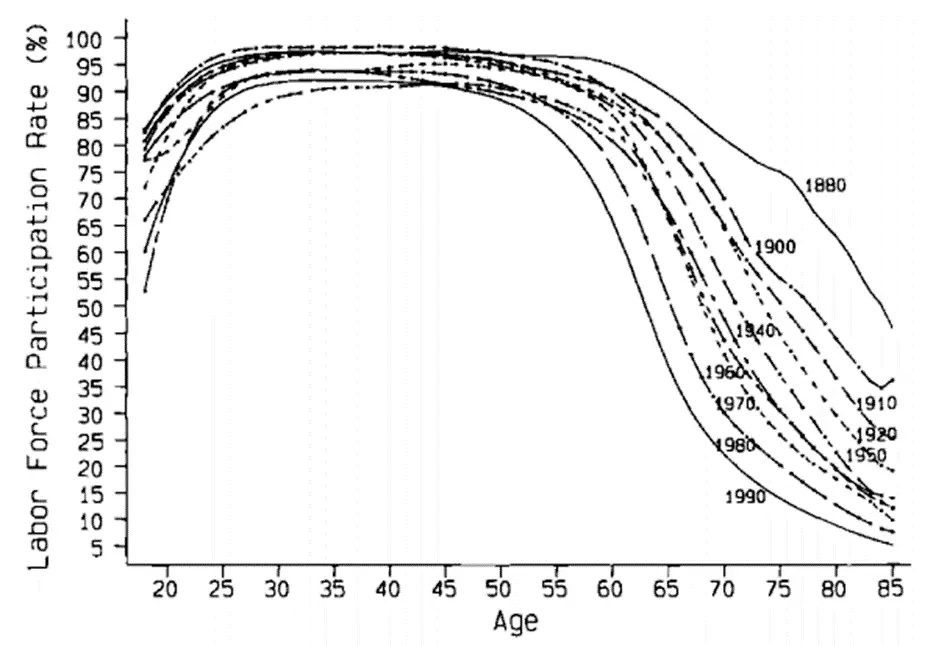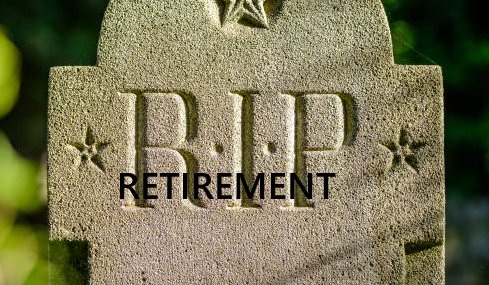RIP Retirement!
RIP Retirement! We only knew you for a century!
While retirement has evolved through the decades, there are some common themes: Traditional retirement is anachronistic.
No longer does one work for 30-40 years, take a pension for the last ten years of frailty, and ultimately die of cardiovascular disease. As lifespans increase and frailty retreats, the concept of retirement needs to be retired.
Let’s examine the historical epidemiology of retirement, discuss its financial aspects, and explain why it is obsolete.
First, let’s look at the history of retirement.
The Historical Epidemiology of Retirement
Let’s start with the labor participation rate by age over history.

Note that in 1880, most people worked, and the decline in labor participation started at about 60 years of age. Most people didn’t live that long, so people worked until they died.
Next, note that compared to each decade, the decline in labor participation starts earlier and increases with age. So much so that by the time we reached 1990, folks had begun stepping away from employment in their 50s despite much longer lifespans.
Historical epidemiology shows that people are leaving the workforce earlier despite longer lifespans.
How much longer lifespans?
Lifespan and Retirement—Average Age of Retirement over Time

Above, you can see life expectancy, the average age of retirement, and the percentage of the population in retirement. Note that as life expectancy increases, the percentage of retirement-aged people increases as the average age of retirement decreases. Another way to say this: even though people are living longer, they are retiring earlier, and thus, the percentage of the population who are retirement age increases.
These are 30-year blocks of time listed above. Note the linear progression in the above data. What if we model forward another 30 years?
Linear modeling shows that in 2030, the life expectancy at birth should be 80, the average age of retirement 58, and the retirement population 20%.
Of course, demographics and medical advances make those figures squishy, but the story is that you will “retire” sooner and live longer than your parents did.
Next, let’s address some financial aspects of retirement. Not only will you have a longer retirement, but you can also not count on the financial tools your parents had!
Retirement RIP—Financial Aspects
Retirement as a unique phase of life began historically with pensions from the military and expanded to other forms of forced retirement during the Industrial Revolution. No one (then or now) retires from working on the land, but the need for industrial workers to keep pace forced frail elderly off the line.
Germany and Otto von Bismark are credited with inventing the retirement age 65, but Social Security disputes that. They credit rail roads and pension systems for the magic retirement age of 65.
Until the increased popularity of the deferred compensation system overtook pensions, retirement was supported by a three-legged stool: social security, pension, and home value.
Historically, this three-legged stool worked well. Now, pensions are gone, and the three-legged stool fails to protect against inflation and longevity concerns.
Let’s focus on inflation first.
How Inflation Makes Retirement an Anachronism
Prior ways to fund retirement no longer work. The three-leg stool is broken.
Let’s start with social security. Of course, there is a cost-of-living adjustment with social security, but intentionally (because it is easier to fund), social security does not keep up with inflation. As the length of retirement increases, this gap widens.
Inflation-adjusted annuities are too expensive. Although pensions do their best to eliminate inflation’s massive (and unknown) liability, fewer pensions offer inflation protection.
While homeownership keeps up with inflation, the truth is that a home returns about 3% per year—just about what inflation takes away, let alone all the costs associated with home ownership.
Even with traditional retirement’s three-legged stool, one cannot keep up with inflation. Retirement is an anachronism.
RIP Retirement: “Income”
Ironically, the wealthy were wealthy in the past not because they had assets but because they had income. In historic London, a rich person did not have several hundred thousand pounds; for example, they had a thousand pounds a month in income.
Retirement income has become a trend. The bad news is that you can no longer expect to survive retirement if you focus on income.
Some are old-fashioned when they talk about living on their income and dividends during retirement. RIP, retirement on income: it just doesn’t work that way anymore!
Interlude—Retirement RIP—Books
Traditional retirement is dead. People don’t even like the word “retirement!”
Books written on the “new” retirement:
Rewirement: changing the way you think about retirement
ReVivement: having a life after retirement
Don’t Retire: Rewire!
It’s like no one even wants to use the word anymore. Indeed, in 1999, AARP dropped “Retired” from its name! As I’ve said, retirement is an anachronism. So, what’s next?
Retirement is an Anachronism
Let’s move to the future. What will retirement look like?
Consider what is currently changing: smartphones and the gig economy.
You won’t retire in the future; you will monetize your hobby and have gigs you get on your smartphone. After all, we have moved from a knowledge-based society to a wisdom-based one. Who has all the wisdom? The new retirement: it is also gig-based! Once we can get over the technology hump.
You can accumulate a nest egg and have a withdrawal plan that doesn’t require work. But who doesn’t want to work for the last 50 years of their life? Work is, after all, the purpose of life beyond family.
As we age healthier, it will be rare to die from “old age.” Don’t plan on a 10-year rest at the end of your life; rather, consider a 50-year period of re-engagement with different aspects of your youth. Rediscover and monetize what worked in your childhood: the new retirement.
While I’m sure articles claiming “RIP Retirement“ have been around since traditional retirement, RIP retirement nonetheless. Retirement is an Anachronism, and there are good great changes afoot.
